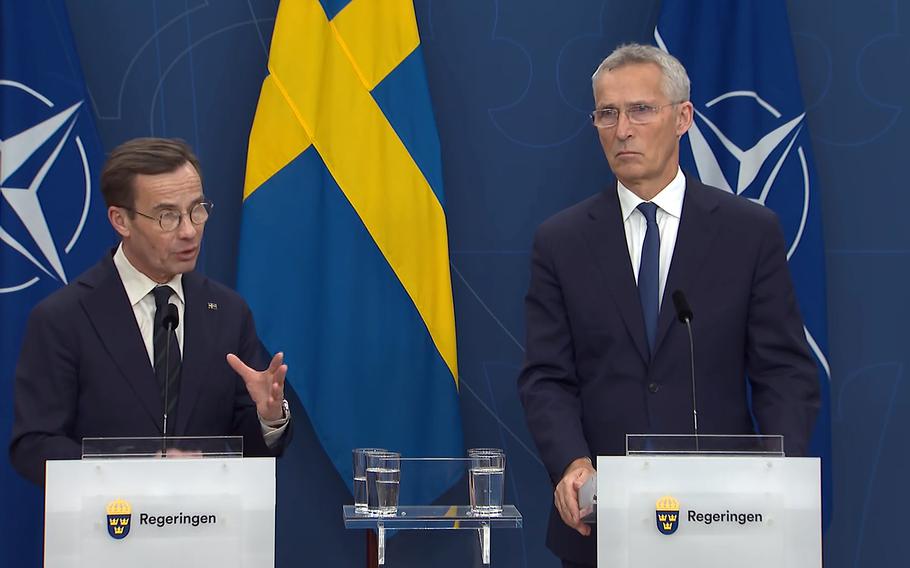
NATO Secretary-General Jens Stoltenberg, right, listens as Swedish Prime Minister Ulf Kristersson answers a question Oct. 24, 2023, at a news conference in Stockholm, Sweden. (NATO)
NATO’s top official called on the Turkish parliament Tuesday to quickly finalize Sweden’s entry into the U.S.-led alliance, which it is on the cusp of joining after months of delays.
“Sweden’s membership will make NATO stronger,” Secretary-General Jens Stoltenberg said Tuesday during a visit to Stockholm, the Swedish capital. “Sweden is fully ready to join NATO. The time has come.”
On Monday, Sweden’s membership bid advanced when Turkish President Recep Tayyip Erdogan gave the green light to his country’s parliament to hold a vote on the matter.
Normally, such votes are a formality for alliance parliaments. It’s not yet clear when Turkish politicians intend to vote.
However, Stoltenberg said the decision should be made in short order, adding that the Nordic country “has fulfilled its commitments.”
“Sweden has amended its constitution, changed its laws, expanded counterterrorism cooperation and resumed arms exports to Turkey,” he said.
Those words were an allusion to Turkey’s complaints over Sweden’s admission to the country of Kurdish groups that Ankara regards as terrorist organizations.
For NATO, the addition of Sweden brings a modern military bolstering alliance defenses in the High North. Melting sea ice in the Arctic has raised the prospect of competition with Russia for natural resources.
The full-scale Russian invasion of Ukraine in February 2022 prompted Sweden and neighboring Finland to seek NATO membership and end long-entrenched policies of neutrality. Finland’s accession occurred in April.
Initially, the two countries planned to join the alliance together, but Turkey’s roadblocks stalled the process for Sweden, much to the dismay of the U.S. and other NATO members.
During the talks Tuesday, Stoltenberg also addressed concerns about the recent damage to critical infrastructure in the Baltic Sea.
Last week, Sweden reported partial damage to an undersea telecommunications cable connected to Estonia.
Authorities suspect that the damage to the cable occurred at the same time an undersea gas pipeline and telecommunications cable running from Finland to Estonia was found to be damaged.
Sweden concluded that the damage was deliberate, Prime Minister Ulf Kristersson said Tuesday, but he stopped short of blaming any country for the sabotage.
News reports have since emerged saying that Russian and Chinese vessels were operating in the area near where cables were damaged. Stoltenberg said allies continue to investigate.
In response, NATO has stepped up Baltic Sea patrols with drones, reconnaissance planes and ships.